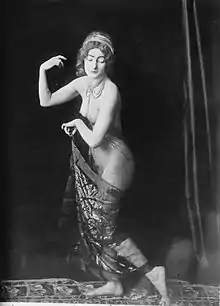Adorée Villany
Adorée Via Villany (1891–?) was the stage name for a French dancer and choreographer.
Adorée Villany | |
|---|---|
 | |
| Born | 1891 Rouen, France |
| Died | Unknown |
| Nationality | France |
Biography
She was born in Rouen and was drawn to the theatre at a young age. She was self-taught as a performer. She first caught the public's attention in 1905 when she performed the Dance of the Seven Veils; she incorporated spoken text in French from Oscar Wilde's play Salome into her performance. Her works explored mythical, historical and Oriental themes, as well as sometimes possessing abstract qualities. Villany also incorporated themes from paintings by contemporary artists such as Franz Stuck and Arnold Böcklin. She designed her own costumes, which were often very revealing, and uncovered her body during her performances. Villany performed in Prague, Paris, Ghent, Berlin, Rotterdam, Vienna and Brussels and at spas such as Marienbad and San Sebastián.[1]
She was prosecuted for obscenity in Munich in 1911 but was acquitted; the jury found that her performance was in the "higher interests of art".[1][2] In 1913, she was fined 200 francs by the Tribunal correctionnel in Paris for indecent exposure.[3]
Villany published a book on dance Tanz-Reform und Pseudo-Moral in 1912 which expressed her aesthetic principles.[1]
She appeared in the 1915 film Slør-Danserinden.[4]
References
- Toepfer, Karl (1997). Empire of Ecstasy: Nudity and Movement in German Body Culture, 1910–1935.
- "Dancer is Acquitted". New York Times. March 10, 1912.
- "Adorée ou l'ardeur : « Mon corps dévoilé met mon âme à nu »". Agora Vox (in French). January 2, 2016.
- "Slør-Danserinden" (in Danish). Danish Film Institute.